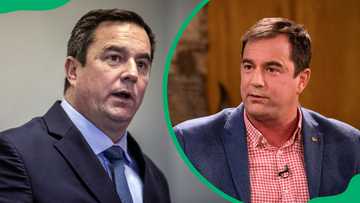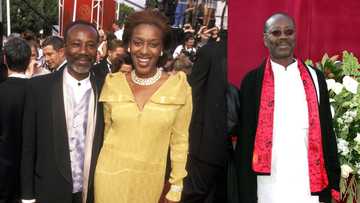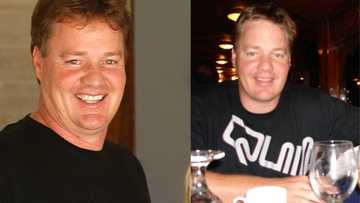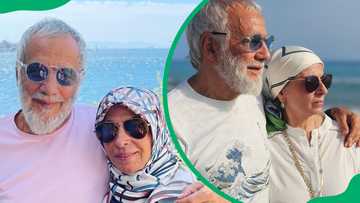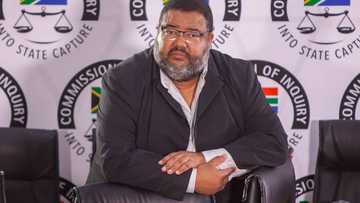FW de Klerk's bio: family, education, career, foundation, net worth
Even if you do not have a soft spot for politics, the name FW de Klerk is familiar to you! His is a household name among the netizens of Mzansi. He is popular for serving as the president of South Africa from 1989 to 1994. Something peculiar about this renowned politician is that he was the last president under the apartheid rule. He is remembered for initiating the end of the apartheid system of racial segregation as well as negotiating a transition to majority rule in the country.
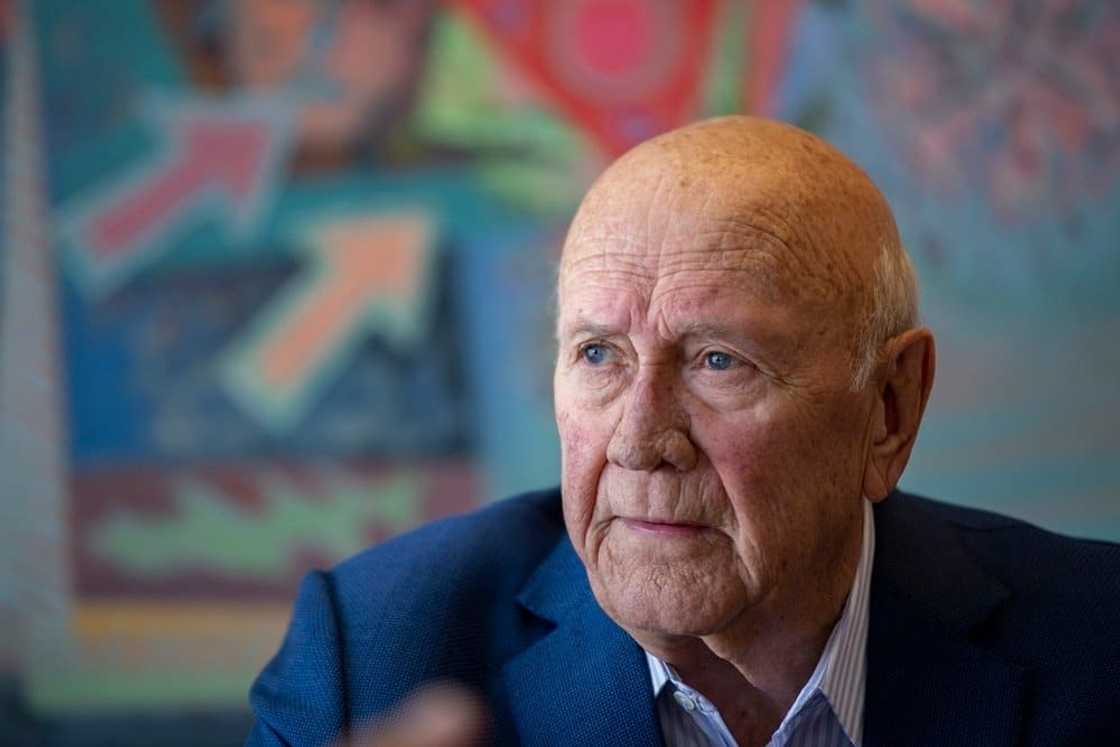
Source: Twitter
Mandela and de Klerk both were honoured with the Nobel Prize for Peace in 1993 because of their dire efforts to initiate a non-racial democracy in the country. He opposed P.W. Botha for resumption in the office of Presidency South Africa after he fell ill. His political success is a result of the power base he had established in Transvaal when he held the position of chairman, Provincial National Party.
Profile summary
- Full names: Frederik Willem de Klerk
- Popular name: FW de Klerk
- Date of birth: March 18, 1936
- Age: 85 years
- Zodiac sign: Pisces
- Place of birth: Johannesburg, Transvaal (now Gauteng), South Africa
- Date of death: November 11, 2021
- Nationality: South African
- Gender: Male
- Sexuality: Straight
- Mother: Hendrina Cornelia Coetzer
- Father: Johannes de Klerk
- Sibling: Willem de Klerk
- Marital status: Married
- Wife: Elita Georgiadis (from 1999)
- Ex-wife: Marike Willemse (1959–1996)
- Children: Susan, Jan, and Willem
- School: Monument High School
- University: Potchefstroom University (Bachelor of Arts and Bachelor of Law)
- Occupation: Politician, who served as state president of South Africa (1989–1994) and as deputy president (1994–1996)
- Political party: National Party (1972–1997), New National Party (1997–2004)
- Awards and honors: Nobel Prize (1993)
- Net worth: $46 million
FW de Klerk's biography
The former South Africa president was born in Johannesburg, Transvaal (now Gauteng), South Africa. His parents were Johannes de Klerk and Hendrina Cornelia Coetzer. The FW de Klerk family has a history in politics as his father was a popular politician.
In 1958, he graduated from Potchefstroom University with a law degree. After completing his undergraduate studies, he established his law firm in Vereeniging and practised for a few years.
How old was FW de Klerk?
FW de Klerk was born on March 18, 1936. At the time of his death, he was 85 years old.
FW de Klerk's career
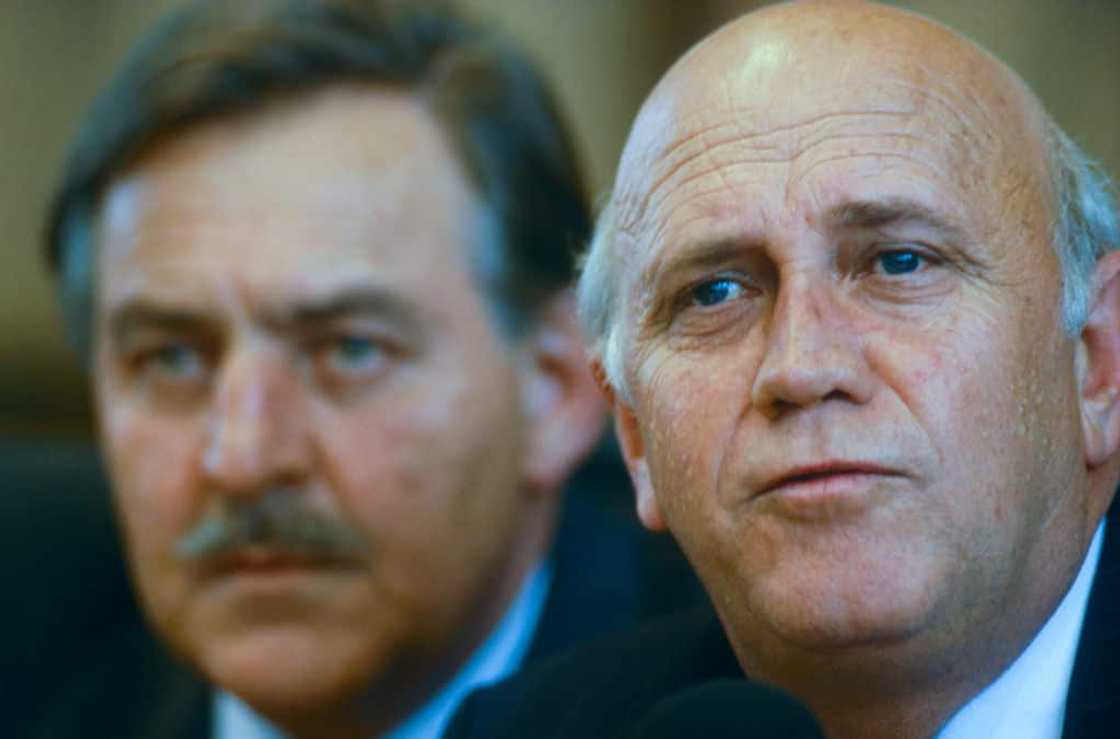
Source: Getty Images
In 1972, he was elected to the Parliament under the National Party. He then held various ministerial posts between 1978 and 1985, such as Minister of Posts & Telecommunications, Sports & Recreation, Mines, Energy & Environmental Planning, and Internal Affairs and others.
From 1982 to 1989, he became the National Party leader in the Transvaal province. From 1984 to 1989, he was the Minister of National Education & Planning. In 1986, he was appointed as the South African House of Assembly leader.
In 1989, de Klerk was elected as the national leader of the National Party, and on September 15, 1989, he was sworn in as the president of South Africa. In 1990, he announced that he would legalise the ANC and free Nelson Mandela, which was effected within weeks. In 1993, he was awarded the Nobel Peace Prize.
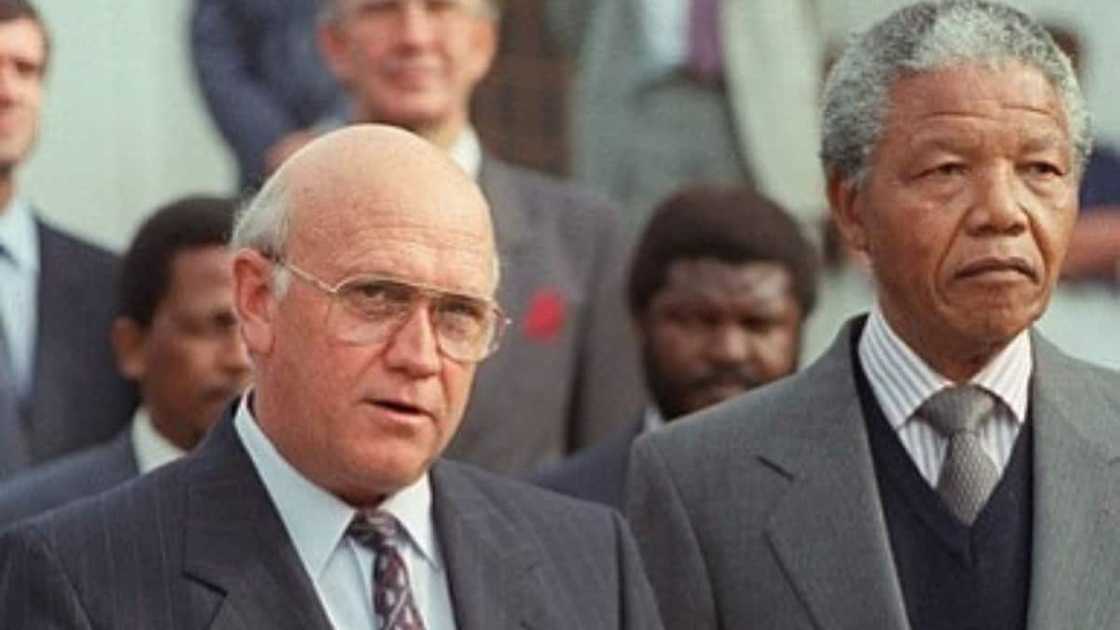
Source: UGC
Interesting to note, in 1994, during the first South African's multi-racial democratic elections, his party lost to the African National Congress under Nelson Mandela. He then assumed the second deputy position in the new government until 1996.
In 1997, he resigned from politics. In June 2006, de Klerk was hospitalized due to respiratory complications after undergoing colon cancer surgery. In 2013, he was hospitalized and had a pacemaker installed.
READ ALSO: Erin Andrews' husband bio: Jarret Stoll's age, spouse, salary, team, net worth
Achievements
Here are some of his achievements:
- He announced that he would legalize the ANC and free Nelson Mandela in 1990.
- He embraced a new constitution that brought the apartheid system to an end in 1993.
- He was part of the team that helped South Africa land the 2010 World Cup in 2004.
- He was honoured with the FW de Klerk Nobel peace prize together with Nelson Mandela in 1993.
FW de Klerk's family
The former SA president's first wife was Marike de Klerk. She was a politician under the National Party. In 1999, de Klerk and his wife, Marike de Klerk, were divorced. In 2001, she was murdered in her house in Cape Town.
READ ALSO: Kid Tini bio: age, family, education, songs, albums, net worth
FW de Klerk's wife Elita
The politician then married Elita Georgiades in 1999. Elita was born to millionaire shipping magnates. Her parents were often busy so the girl was left to a nanny and then sent off to a school. Her mother, Nitza, insisted that her daughter learn French.
At the age of 18, Elita married Tony Georgiadis, the Greek ship-owner. Elita divorced her husband and fell in love with the then South African president. Elita and FW de Klerk had to walk the difficult path to be together.
FW de Klerk's children
With Marike de Klerk, the politician had three children, Jan, Willem, and Susan. Susan de Klerk was a teacher, Jan became a farmer in Western Transvaal, and Willem went into public relations. In October 2020, Willem de Klerk died at the age of 53 after a battle against cancer. Willem stated that their father had a close relationship with them.
FW de Klerk Foundation
In 1999, he published his autobiography known as The Last Trek. In 2000, he established the FW de Klerk Foundation and the Global Leadership Foundation in 2004. The NGO constitution is geared towards peace in societies that are divided based on ethnic, cultural, or religious lines, which is ample for the society.
READ ALSO: Gaosi Raditholo's bio: age, partner, family, Muvhango, career, best pics, profile
FW de Klerk quotes
Here are some of his quotes:
The question that we must ask is whether we are making progress toward the goal of universal peace. Or are we caught up on a treadmill of history, turning forever on the axle of mindless aggression and self-destruction?
I have made the most profound apology in front of the Truth Commission and on other occasions, about the injustices which were wrought by apartheid.
Above all, we owe it to the children of the world to stop the conflicts and to create new horizons for them.
In our quest for peace, we should constantly ask ourselves what we should do to create conditions in which peace can prosper.
I believe that first impressions are very important.
The relationship between me and President Mandela right at the beginning was not a very well-established relationship. It was based on two meetings.
President Mandela was not a hands-on president at any time.
For many years, I supported the concept of separate states.
I felt a sense of fulfillment that an action plan, which I'd laid on the table on February 2 1990, had been fulfilled, had been properly implemented within the time frame which I envisaged.
You cannot say we are a healthy, dynamic democracy when one party wins almost two-thirds of the vote.
When I talk about the end of apartheid, I prefer not to claim the honor that I have ended it.
What I haven't apologised for is the original concept of seeking to bring justice to all South Africans through the concept of nation states.
It was an honour for me to have been able to work with Mr. Mandela in the process that led to the adoption of the interim constitution and our first democratic elections in April 1994.
My predecessor, P. W. Botha, had an inner circle, and I did not like it. I preferred decisions to evolve out of cabinet discussions. That way, we achieved real co-ownership of our policies.
The government that came into power after the April 1994 elections was going to need a budget. It was drafted by our finance minister, Derek Keys, and he convinced them of the necessity to stay within the free-market principles that had been in force in South Africa for decades.
When I first met Mandela, we did not discuss anything of substance; we just felt each other out. He spent a long time expressing his admiration for the Boer generals and how ingenious they were during the Anglo-Boer war.
FW de Klerk's net worth
His net worth is estimated to be about $46 million. His wealth is attributed to his political career, his Nobel Peace Prize award, and also the fact that he came from a wealthy family. His house is located in Cape Town, South Africa, where he resides with his family.
READ ALSO: Michael Mckean bio: age, wife, movies and TV shows, net worth, latest updates
FW de Klerk's death
The former South African president and final apartheid leader, FW de Klerk, died at the age of 85. It happened on Thursday morning at his home in Fresnaye, Cape Town.
Dave Steward, the FW de Klerk Foundation's spokesperson, confirmed his death to News24 and said:
The former president died earlier this morning at his home in Fresnaye after his struggle against cancer. He was 85 years old. He is survived by his wife Elita, two children Susan and Jan, and his grandchildren.
The foundation had announced the diagnosis - mesothelioma, wich is a cancer that affects the lining of the lungs. They made the announcement through its website on the former president's 85th birthday.
When did FW de Klerk die?
On November 11, 2021, former South African State President FW de Klerk passed away.
FW de Klerk is vividly remembered as one of the presidents of South Africa who made history. His key role in ending the apartheid rule in his era is notable as it brought change to the country's political arena and freedom to the Mzansi people.
READ ALSO: Top 10 great African leaders of all time and their achievements
Briefly.co.za posted an article about the top 10 great African leaders of all time. These men and women were willing to put everything on the line to make changes in Africa. Get a list of the great African leaders who helped shape the history of the land many of us call home. They were pioneers in their own rights. Read more about them and their achievements in the article.
Source: Briefly News

